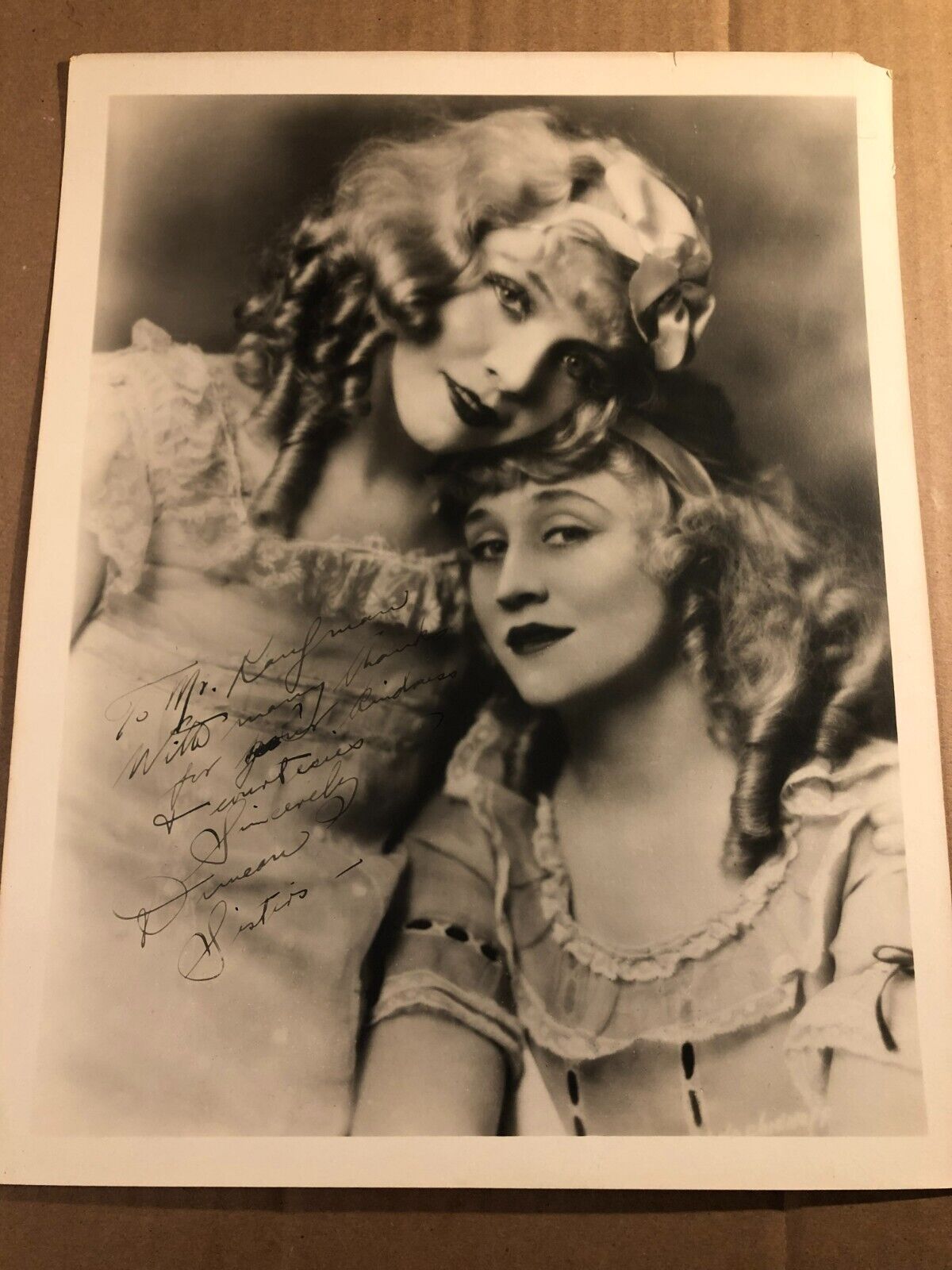-40%
Bobby Clark Very Rare Very Early Autographed 8/10 Photo 30s Gay Nighties
$ 79.19
- Description
- Size Guide
Description
Here is an extremely rare very early vintage original autographed 8" by 10" photo of actor Bobby Clark / Robert Edwin Clark (June 16, 1888 – February 12, 1960), from his prime in the 1930s. Bobby Clark was a minstrel, vaudevillian, performer on stage, film, television and the circus. Known for Two Flaming Youths (Paramount) (1927) (feature film) (also appearing were W. C. Fields, Moran and Mack),Scratch-As-Catch-Can (1931),
Kickin' the Crown Around (1933),
The Gay Nighties (1933),
Alibi Bye Bye (1935),
The Goldwyn Follies (1938). Known for his painted-on eyeglasses, he was part of a comedy team with Paul McCullough for 36 years. He was born in Springfield, Ohio. While still in grammar school he formed a friendship with classmate Paul McCullough. The two attended tumbling classes, and began performing an acrobatic act in minstrel shows and later in the Ringling Brothers' Circus. The team worked as clowns from 1906 to 1912. In 1912 they made their debut in vaudeville with a pantomime act built around the simple act of placing a chair on top of a table. In 1922 they starred in Irving Berlin's Broadway show Music Box Revue. Beginning in 1929, they made a series of about 35 short comedy films, for FOX and RKO, some of which are still extant. C
lark & McCullough performed together until McCullough's suicide in March 1936.
In 1939 Clark appeared on Broadway in The Streets of Paris, sharing the stage with a new comedy act: Abbott & Costello.
Clark appeared on television during the 1950–51 television season, in the 8–9 pm Sunday night time slot of The Colgate Comedy Hour; however, Clark's four episodes were among those sponsored by Frigidaire and titled simply The Comedy Hour.
The Goldwyn Follies, his last and only film without Paul McCullough, in 1938, was the first Technicolor film produced by Samuel Goldwyn.
The Clark & McCullough shorts were made for an adult audience, with Clark writing much of the dialogue. Like Wheeler & Woolsey’s films, they were not released for television, being considered too vulgar. So, they did not enjoy the renaissance of popularity with a new generation, on television, like The Three Stooges, or Laurel & Hardy.
He appeared on Broadway in the Ziegfeld Follies of 1936. His reputation grew as he tackled roles in plays such as Sheridan's The Rivals, as well as in musical comedies and revues.
Starting in 1942, producer Mike Todd cast him in five Broadway shows, all of them successful: the musical revue Star and Garter with Gypsy Rose Lee (1942–43); the Cole Porter musical Mexican Hayride (1944–45); Molière’s The Would-Be Gentleman (1946); and the revues As the Girls Go (1948) and Michael Todd's Peep Show (1950).
He appeared on Broadway in the Ziegfeld Follies of 1936. His reputation grew as he tackled roles in plays such as Sheridan's The Rivals, as well as in musical comedies and revues.
Starting in 1942, producer Mike Todd cast him in five Broadway shows, all of them successful: the musical revue Star and Garter with Gypsy Rose Lee (1942–43); the Cole Porter musical Mexican Hayride (1944–45); Molière’s The Would-Be Gentleman (1946); and the revues As the Girls Go (1948) and Michael Todd's Peep Show (1950).
He came out of retirement to tour with Damn Yankees, 1956–58, in the role created on Broadway by Ray Walston.
As well as his better-known stage and film credits, Clark directed and appeared in such Restoration comedy as Congreve's Love For Love, and lectured on this period of theatre at the American Theater Wing.
Bobby Clark died in New York City in 1960. Minor corner and edge wear. Extremely rare.
Will ship worldwide. I always combine shipping on multiple orders.
Famed vaudeville comedian Bobby Clark was born in Springfield, Ohio on June 16, 1888. When he was 12 years old, Bobby and his classmate Paul McCullough created a tumbling act that they took on the road. The duo toured with a traveling minstrel troupe before joining a circus as clowns. The clown act eventually matured to the point where it was time to graduate from the circus to the more sophisticated vaudeville circuit.
Clark & McCullough debuted as a vaudeville comedy team at the Opera House in New Brunswick, New Jersey in 1912. Their popularity increased, and after the First World War, they began appearing in London, where they made a great success in musical-comedy. After seeing them in London, composer Irving Berlin signed them for his own Broadway show, the "Music Box Revue". It was a smash hit, and by the time taking pictures debuted, they signed with Fox for a series of one-reel recreations of their act. However, both comedians were uncomfortable with the new medium and soon returned to Broadway. In 1930, RKO-Radio Pictures signed them up to make shorts, and the deal allowed them to continue making Broadway appearances. From 1930 to 1935, from A Peep on the Deep (1930) to Alibi Bye Bye (1935), Clark & McCullough appeared in 22 shorts for RKO, many of which were scripted by Clark himself, with Clark nominally the dominant one closely shadowed by the less talkative McCullough, who was known for his reactive, raucous laugh.
In 1935, after they had finished their vigorous slate of short films for RKO, Clark & McCullough went on tour with "The George White's Scandals". However, McCullough experienced a nervous breakdown from overwork and was committed to a sanitarium for depression and extreme exhaustion. Shortly after being released in early-to-mid March 1936, the comedian visited a barbershop (on March 23rd), and attempted suicide by slicing his neck and wrists with the barber's own razor. Paul McCullough died two days later.
Bobby Clark was devastated. Aside from a bit part in The Goldwyn Follies (1938), he never again appeared in movies. He spent several months in seclusion after his partner's death, but finally returned to Broadway in "The Ziegfeld Follies of 1936". His appearances on Broadway continued, and his fame grew again as he appeared in legitimate plays such as Sheridan's "The Rivals" as well as musical comedies and revues. Begining in 1942, producer Mike Todd cast him in five Broadway shows, all of them smash hits: the musical revue "Stars & Garters" with Gypsy Rose Lee (1942-43); the Cole Porter musical "Mexican Hayride"(1944-45); a production of Molière's "The Would-Be Gentleman"(1946); and the musical revues "As the Girls Go"(1950) and "Michael Todd's Peep Show" (1951).
Bobby Clark also hosted segments of the TV show The Colgate Comedy Hour (1950) produced by Todd. He then bid showbiz adieu, although he emerged from retirement in 1956 to tour with the road show of "Damn Yankees!". Clark died on February 12, 1960, having outlived the minstrel show, vaudeville and burlesque eras. He was 71 years old. The duo of Clark & McCullough is lesser known today than their comedy contemporaries (Three Stooges, Laurel & Hardy", etc.) primarily because their many short films were considered too risqué to be replayed on TV.
















